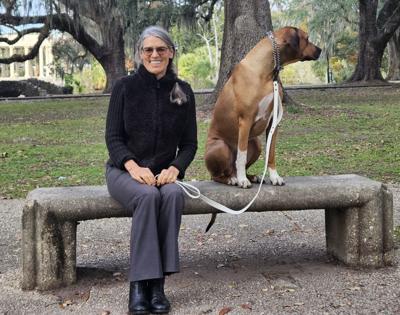"I come as the advocate of helpless, forgotten, insane men and women; of beings sunk to a condition from which the unconcerned world would start with real horror."
Dorothea Dix made those remarks to Massachusetts lawmakers in the mid-19th century. The treatment of mentally ill people has certainly improved since. Dix went on to campaign relentlessly and successfully to establish some of the first asylums in the U.S. which were the foundation of the country's flawed efforts to deal with mental illness — particularly the "indigent" mentally ill, as the poor were referred to — over the subsequent century.
Though treatment is better compared to Victorian times, Dix's words would still evoke in the modern listener a sense of recognition.
In New Orleans, the idea of shrinking from our fellow beings sunk to such a condition might evoke some of the people we occasionally encounter sleeping on our streets, or wandering through a public square engaged in a conversation with themselves, occasionally seeming to pose a danger to themselves or others.
Who looks after such people with serious mental illness who clearly lack the ability to look after themselves? Mostly, they have been left to fend for themselves until the inevitable intervention by police.
Janet Hays has been one of the few people who advocate on a full-time basis for the seriously mentally ill in New Orleans. She is focused on helping her clients and their families to first identify a serious illness — like schizophrenia, bipolar disorder, deep depression — so they can get long-term care in a secure environment without being criminalized.
She is founder and director of Healing Minds NOLA, a grassroots nonprofit organization that also lobbies for new and better policies to provide the right level of treatment.
"The good thing about Louisiana is that it is not that hard for us to get someone into a hospital when they're sick and they don't know they're sick," she said. "The problem is we can't keep them long enough in hospital to truly experience stability and then have them discharged to a safe space."
Charity Hospital campaign
Hays got into mental health advocacy somewhat by accident when she found herself, in the wake of Hurricane Katrina, drawn into the fight to try and reopen Charity Hospital, which before the storm had provided about 500 beds for poor people with mental disorders.
That fight was not successful as then-Gov. Bobby Jindal focused on backing the new University Medical Center and Veterans Affairs Medical Center, which offered only a fraction of the number of beds that had been available at Charity.
The problem persists and Hays went on from her role as Health Justice Advocacy Director for the Save Charity Hospital effort to found Healing Minds.
A self-described hippy spirit, Hays started life in Canada, growing up mostly in rural Alberta province, near Calgary. Her father was a lawyer and her grandfather was a rancher and politician. She says she probably got her advocacy bug from them.
But early on, Hays was drawn to music at university and qualified in music production. She first came to New Orleans in the early part of this century to work with Henry Butler, assisting the blind pianist in his recording studio.
When the city flooded, she lost most of her possessions and like many of her fellow New Orleanians had to rebuild and start afresh.
Over lunch in mid-December at Ralph's on the Park, Hays talks about some of the two dozen or so current active clients. They are complicated problems.
She describes one man who has been in and out of the criminal justice system as he posed a threat, from time to time, to his mother. Typically, the fact his mental health issues are accompanied by substance abuse issues make the problem hard to diagnose and the solution difficult to prescribe.
Homelessness also often accompanies and exacerbates mental health issues.
Nationally, it is estimated that about one-third of the homeless population suffer from varying levels of mental health problems, according to the U.S. Department of Housing and Urban Development (HUD), the Substance Abuse and Mental Health Services Administration.
Hays reckons that locally it might be a higher percentage because the city has been a draw for people regionally looking for a relatively safe haven.
The situation was improved in Louisiana by the 2008 Assistive Outpatient Treatment Act, which has allowed local courts to to order involuntary outpatient treatment for individuals. Hays' nonprofit administers the New Orleans AOT program, working with the Treatment Advocacy Center, another nonprofit, to get clients care rather than jail.
The gap in the system, Hays says, is what to do after hospital.
"The biggest problem right now — the elephant in the room — is that we don't have what's called the intermediate levels of care," she said, i.e. what happens after someone is stabilized after an acute psychiatric episode.
"They need a gradual step down from the hospital to a period of stabilization treatment and then, hopefully, to independent living, or at least somewhere they can survive safely on their own," she said.
The advocacy for that type of system continues.


